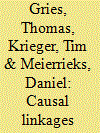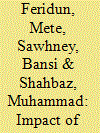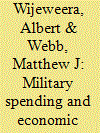|
|
|
Sort Order |
|
|
|
Items / Page
|
|
|
|
|
|
|
| Srl | Item |
| 1 |
ID:
107553


|
|
|
|
|
| Publication |
2011.
|
| Summary/Abstract |
Although life cycle costing (LCC) is internationally considered the best instrument for evaluating investments in military equipment, its practical application remains insufficiently studied. This paper presents an international panorama of systems used for evaluating military investments, identifying the procedures and instruments most commonly employed, and identifying their strengths and weaknesses. The LCC methodology is then systematically applied, revealing opportunities for improvements. The research methodology is based on a questionnaire sent to 64 countries, inquiring into their standard practice regarding decision taking, cost estimation, risk management and performance indicators. The results obtained show that the main limitations facing these countries in employing LCC methodology concern weaknesses in their organizational structures and in their technical regulations, with particular respect to cost breakdown structures. Also significant are the scant number of cost estimation models available, the absence of up-to-date, reliable databases and the limited use made of appropriate techniques for risk and uncertainty estimation.
|
|
|
|
|
|
|
|
|
|
|
|
|
|
|
|
| 2 |
ID:
107552


|
|
|
|
|
| Publication |
2011.
|
| Summary/Abstract |
We use the Hsiao-Granger method to test for terrorism-growth causality for seven Western European countries. In bivariate settings, the impact of economic performance on domestic terrorism is very strong. In trivariate settings, the impact of performance on terrorism diminishes. In general, we find that economic performance leads terrorist violence in robust ways only for three out of seven countries. Terrorism is almost never found to causally influence growth in bivariate and trivariate specifications. Our findings indicate that the role of economic performance in determining terrorist violence appears to have been important for some countries, whereas all attacked economies have been successful in adjusting to the threat of terrorism.
|
|
|
|
|
|
|
|
|
|
|
|
|
|
|
|
| 3 |
ID:
107551


|
|
|
|
|
| Publication |
2011.
|
| Summary/Abstract |
We develop a model of repeated conflict that features probabilistic winner-take-all outcomes and compare its dynamics to the dynamics generated by a similar deterministic model in which combatants divide the conflict spoils. While these models generate the same behavior in a one-shot game, in a repeated setting the winner-take-all model generates richer dynamics than the dynamics generated by the deterministic model, which are new to the economics literature on conflict. As in real-world conflicts, the winner-take-all model generates changes in the relative dominance of combatants, full mobilization of fighting resources, and endogenous surrender. We evaluate the implications for the literature.
|
|
|
|
|
|
|
|
|
|
|
|
|
|
|
|
| 4 |
ID:
107555


|
|
|
|
|
| Publication |
2011.
|
| Summary/Abstract |
The present study aims at investigating the causal relationship between defence expenditures and economic growth in the case of North Cyprus using the Autoregressive Distributed Lag (ARDL) bounds testing approach to cointegration and Granger causality tests for the period from 1977 to 2007. The results suggest that the variables in question are in a long-run equilibrium relationship and that there exists a strong, positive unidirectional causality running from defence expenditures to economic growth.
|
|
|
|
|
|
|
|
|
|
|
|
|
|
|
|
| 5 |
ID:
107554


|
|
|
|
|
| Publication |
2011.
|
| Summary/Abstract |
Despite the large number and variety of studies addressing the relationship between military spending and economic growth, a consensus regarding the exact nature of any relationship between the two has proven elusive. This study uses a panel co-integration approach to examine the relationship between military spending and economic growth in the five South Asian countries of India, Pakistan, Nepal, Sri Lanka and Bangladesh over the period of 1988-2007. It finds that a 1% increase in military spending increases real GDP by only 0.04%, suggesting that the substantial amount of public expenditure that is currently directed towards military purposes in these countries has a negligible impact upon economic growth.
|
|
|
|
|
|
|
|
|
|
|
|
|
|
|
|
| 6 |
ID:
107556


|
|
|
|
|
| Publication |
2011.
|
| Summary/Abstract |
I develop a dynamic model of social conflict whereby manifest grievances of the poor generate the incentive of taking over political power violently. Rebellion can be an equilibrium outcome depending on the level of preexisting inequality between the poor and the ruling elite, the relative military capabilities of the two groups and the destructiveness of conflict. Once a technology of repression is introduced, widespread fear reduces the parameter space for which rebellion is an equilibrium outcome. However, I show that repression-driven peace comes at a cost as it produces a welfare loss to society.
|
|
|
|
|
|
|
|
|
|
|
|
|
|
|
|
|
|
|
|
|